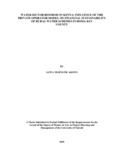| dc.description.abstract | Water sector reforms focused on: reducing the Government‟s participation in direct
delivery of water services, commercialising water market and encouraging participation of
private operators, in order to enhance efficiency and sustainability of water services. Studies
conducted in various developing countries show evidence of a significant relationship between
the private operator model and financial sustainability of rural water schemes. Nonetheless, no
such study had ever examined influence of the private operator model on financial sustainability
of rural water schemes in Homa Bay County. Based on key concepts of the four pillars model,
this study examined the statistical relationship between various attributes of Homa Bay Water
and Sewerage Company (the private operator) and financial sustainability of its rural water
services. The study adopted a cross-sectional survey design, with both quantitative and
qualitative approaches. Primary data were sourced from the operator‟s staff, water users and
water management committees in April 2017. Both quantitative and qualitative techniques were
applied to process and analyse data. Quantitative techniques included cross-tabulation with Chi
square tests, Relative Importance Index, Kendall‟s Coefficient of Concordance and Spearman‟s
Rank Correlation Coefficient. Key findings of the study show a strong level of concordance of
participants‟ views regarding organisational planning aspects (Kendall‟s W = 0.741); income
diversification aspects (W = 0.686); management practices (W = 0.862); and revenue generation
aspects (W = 0.893). The findings also show that the operator‟s performance in defraying O&M
costs for its rural water schemes positively and significantly correlated with organisational
planning (rs = 0.430; ρ-value = 0.000); income diversification (rs = 0.375; ρ-value = 0.014);
management practices (rs = 0.430; ρ-value = 0.000); and revenue generation (rs = 0.568; ρ-value
= 0.000). The study concludes that consistent implementation of strategic and financial plans;
improving diversification of internal income sources; ensuring that procurement activities are
strictly guided by relevant laws and policies; as well as reducing non-revenue water and
unaccounted for water, are crucial for improving the operator‟s competitiveness in the
commercialised water market; as well as performance in defraying O&M costs and achieving
financial sustainability for its rural water schemes. The study amplifies the need for stakeholders
to: ensure consistent implementation of the strategic and financial plans to guide water supply
activities; diversify internal income sources to improve the operator‟s competitiveness; improve
procurement practices by sensitising the operator‟s staff, Board members and tender committee
on procurement laws and policies; initiate active partnership forums with community structures
to facilitate early detection and reporting of physical leakages, spillage, illegal connections and
defective metering equipment; as well as upgrade the billing system and promote mobile phone
payment method to improve revenue collection. | en_US |

